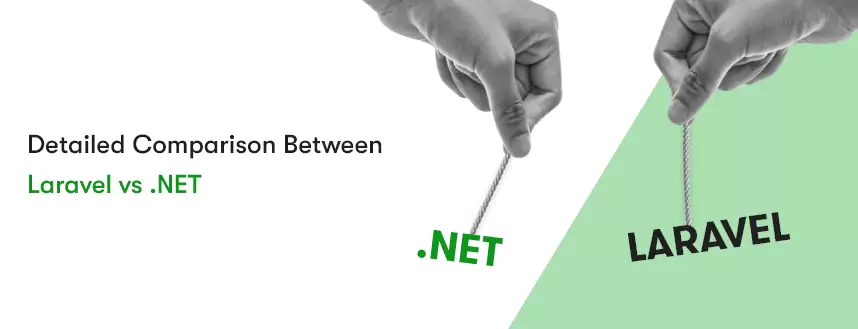Laravel and .NET, undoubtedly powerful frameworks, offer a plethora of benefits for web application development. Both frameworks boast top-notch features, but it is essential for experts to anticipate the ideal choice based on project specifics. However, the dilemma of selecting between Laravel and .NET often plagues the minds of entrepreneurs. To shed light on this matter, we have decided to write this blog, where we will delve into factors such as efficiency, versatility, accuracy, and implementation, comparing Laravel and .NET head-to-head.
The internet is a playground ruled by web applications. With a mind-boggling 8.09 million apps in play worldwide, competition in this industry is cutthroat. Laravel Vs. .Net, are two frameworks that not only dominate the field but also engage in a fierce rivalry. So let us discuss these two powerhouses in detail and find out the winner of web development supremacy.
What is Laravel?
Laravel is a highly popular open-source PHP framework known for its elegant syntax, developer-friendly features, and robust ecosystem. Its ecosystem encompasses not only its expressive syntax but also a vast collection of pre-built components. Developers around the world rely on Laravel’s comprehensive toolkit to build modern and dynamic web applications. With Laravel, developers can achieve rapid Laravel development while ensuring code quality and scalability.
What is .Net?
On the other hand, .Net is a framework developed by Microsoft. It offers support for multiple programming languages such as C#, VB.Net, and F#. Similar to Laravel, developers appreciate the extensive set of tools and libraries provided by .Net for developing scalable web applications. Due to its association with Microsoft, the framework is widely used for building enterprise-grade applications.
Both Laravel and .Net excel in terms of performance, security, and scalability. Determining which framework is more popular is a challenging task since they cater to different developer communities and project requirements.

Let’s dive into a detailed comparison between Laravel and .Net to gain a better understanding of their strengths and differences.
Popularity and Market Share:
When it comes to popularity and market share, analyzing usage statistics can provide valuable insights. As of current data, there are approximately 1,213,741 websites built using Laravel and 9,258,086 websites built using .Net. These numbers give an indication of the frameworks’ adoption in the industry.
However, popularity can be assessed not only based on absolute numbers but also by considering the strength of the community and available resources. In this regard, Laravel surpasses .Net. Laravel holds a significant portion of the market share, accounting for approximately 15% of the total market. On the other hand, .Net holds less than 5% of the market share.
Furthermore, in terms of developer community size, Laravel boasts a larger community with over 3 million developers. These developers actively contribute to the framework’s growth and support the ecosystem. In contrast, ASP.Net, a component of .Net, has a community of around 1 million developers or even fewer.
Pricing:
Both Laravel Vs. .Net are open-source frameworks, which means that the cost of app development using these frameworks is generally affordable. However, there are differences in hosting charges between the two.
Laravel-developed applications are typically hosted on Linux servers. Linux hosting is known for its affordability compared to Windows hosting. This cost advantage makes Laravel an attractive choice for businesses and developers looking for a budget-friendly solution.
Additionally, you will find abundant online resources and strong support from the Laravel community. In case of any queries or issues, developers can rely on the community and online forums to find solutions and assistance.
While,.Net applications require Windows hosting, which often comes at a higher cost compared to Linux hosting. This is something to consider when assessing the overall expenses of developing and hosting an application using .Net. Furthermore, while the .Net community is active, it may not have the same level of extensive support and resources as the Laravel community.
Considering these factors, Laravel emerges as a more affordable option in web development. Want to hire Laravel developers for your project?
Usage and Versatility:
Laravel and .Net are capable of building scalable applications that can handle increasing visitor traffic. However, they approach scalability in different ways.
Laravel adopts a horizontal scaling approach, which involves subdividing the system to distribute the load across multiple servers or instances. This flexibility makes Laravel a favorable choice among developers as it allows them to easily scale their applications by adding more resources horizontally.
Also, Laravel provides a well-structured architecture that enables developers to manage routes, controllers, and views efficiently. The framework’s eloquent ORM (Object-Relational Mapping) simplifies working with databases, making database management more streamlined and convenient.
On the contrary, .Net offers a comprehensive set of tools and features that contribute to its scalability. It excels in vertical scaling, which involves upgrading the hardware or adding more resources to a single server or instance.
.Net provides powerful tools, including built-in debugging capabilities, that aid in diagnosing and resolving issues within the application. These debugging tools make .Net a preferred option for web development projects where thorough debugging and troubleshooting are required.
Learning Curve:
As we have already mentioned, one of the major factors contributing to Laravel’s popularity is its simple and elegant syntax. This characteristic makes it a preferred choice among developers, as it enhances their productivity and code readability.
Moreover, Laravel offers a seamless learning curve, which further contributes to its strong community support. Developers can quickly grasp and implement Laravel’s pre-built components and features, enabling them to develop web applications rapidly. The availability of extensive documentation and tutorials also aids developers in learning and utilizing Laravel effectively.
The learning curve for .Net is relatively steep. The framework encompasses a comprehensive set of tools and features, which require a considerable investment of time and effort to learn & master. As a result, a smaller number of developers commit themselves to learning the intricacies of the .Net framework. This limited pool of developers contributes to comparatively smaller community support for .Net.

Speed, Performance, and Security:
The competition between .Net Vs. Laravel extends to the realm of speed and performance, and surprisingly, both frameworks offer comparable performance capabilities. When it comes to searching for images and files and retrieving results promptly, both .Net and Laravel provide developers with equal access to these functionalities.
However, in terms of security, Laravel emerges as the clear winner. The framework has built-in mechanisms that protect applications against common security vulnerabilities, such as cross-site request forgery (CSRF). Laravel also offers robust access control and validation features, enabling developers to develop secure web applications with ease.
In all, Laravel prioritizes the security of web applications developed using the framework. These built-in security measures contribute to the framework’s reputation as a secure choice for web development.
The .Net security features include:
- Authentication;
- Email verification;
- Hashing;
- Authorization;
- Password Reset;
- Encryption;
Laravel security features include:
- SQL injection;
- Reduce CSRF vulnerabilities;
- Protection against XSS;
- Security packages
- Strong authentication system;
- Hashing;
- Encryption;
Testing and Debugging:
Laravel provides the ultimate unit testing experience. The framework comes equipped with powerful built-in tools that enhance the testing capabilities of applications, enabling developers to create robust and reliable solutions. Laravel’s testing features simplify the process of writing and executing unit tests, making it easier to ensure the quality and correctness of code.
On the other hand, .Net also supports unit testing, but there is a slight difference in the approach. In order to perform a comprehensive suite of tests for .Net systems, developers typically rely on MSTest, which is an entire framework dedicated to testing in the .Net ecosystem.
This means Laravel stands out when it comes to seamless integration of testing tools and features directly into the system. However, resort to expert’s help or Laravel outsourcing for detailed information.
Project Size:
An important factor to consider during the comparison is the suitability of the framework based on the project size.
While Laravel is suitable for both small and large-sized projects, it does have some limitations to keep in mind. The performance of the application might get affected in a very large-scale project that encompasses plenty of users and extensive data processing. On the other hand, .Net is known for its versatility and ability to adapt to newer versions of the framework, making it a suitable choice for projects of various sizes.
Use cases:
Laravel follows MVC architecture which makes it a suitable choice for the following use cases.
- eCommerce development;
- Enterprise development;
- Rapid and MVP development.
The framework is stable and also speeds up the entire web development process. This allows you to meet the deadlines with quality.
Now, as mentioned above, .Net is versatile which makes it suitable for large-sized app development. You can use .Net for the following use cases:
- Mobile, web, and gaming apps;
- IoT solutions;
- Legacy system redevelopment;
Database support:
Laravel offers robust support for multiple databases, including MySQL, PostgreSQL, SQLite, and SQL Server. This flexibility allows developers to choose the most suitable database system for their project’s requirements, ensuring compatibility and scalability.
One of Laravel’s standout features is its built-in database query builder, which provides a convenient and intuitive way to interact with the database. The query builder simplifies complex SQL queries by allowing developers to write database operations using fluent, chainable methods, resulting in clean and readable code.
Laravel also excels in its seamless integration with popular third-party services and platforms. It provides out-of-the-box support for integrating with cloud storage providers like Amazon S3 and Google Cloud Storage, making it effortless to store and retrieve files. Laravel also offers integrations with various payment gateways, enabling secure and streamlined payment processing.
.NET provides robust data support, offering a wide range of tools and technologies to handle data management and processing effectively. Whether you’re working with relational databases, NoSQL databases, or other data storage systems, .NET offers solutions to meet your needs.
It supports popular databases like SQL Server, Oracle, MySQL, and more, allowing developers to work with different database systems seamlessly. In addition to ADO.NET, .NET offers Object-Relational Mapping (ORM) frameworks like Entity Framework (EF) and NHibernate. These frameworks simplify the mapping between relational databases and object-oriented models, reducing the need for manual SQL coding.
.NET’s data support extends beyond traditional databases, encompassing other data-related functionalities. It provides libraries and frameworks for working with XML, JSON, file systems, messaging queues, and more.
Laravel vs. .NET: A Comprehensive Comparison Table
| Parameters | Laravel | .Net |
| Developed by | Taylow Otwell | Microsoft |
| Technology | Framework | Platform |
| Programming language | PHP | C#, F3, Visual Basic |
| Project size | Medium and Small | Medium and Large |
| Code Type | Interpreted | Compiled |
| Scalability | Horizontal | Vertical |
| Development Speed | Fast | Fast |
| Cost of Development | Not much costly | Alibaba Travels, Cognizant, Queue-it, DevRain |
| Support | Affordable on the higher side | Microsoft developer’s community |
| Learning curve | Steep | Seamless |
| Tools and Kits | Limited third-party extensions and third-party tools configurations | In-build libraries, tools and guidelines. |
| Companies using the framework | Bitpanda, Razorpay, Mastercard, Kmong, TransferGo, 9Gag | Alibaba travels, Cognizant, Queue-it, DevRain |
| SEO-friendly | Supports SEO . Laravel-based websites are SEO-friendly and generate SEO-friendly routes and URLs. | It is quite difficult to generate SEO-friendly websites using .Net |
What is best for your project? Laravel Vs. .Net Debate conclusion:
There are a lot of things to be taken into consideration while deciding the clear winner between Laravel vs. .NET: A Comprehensive Comparison Table. Ultimately, the best pick for your project depends on your specific requirements and goals. This is why we advise you to get in touch with our team and avail of our guidance in selection.
We can provide expert guidance and assist you in selecting the framework that aligns best with your project’s needs. We have served many clients globally and served them with a variety of successful solutions.
Remember, choosing the right framework is crucial for the success of your project, and our team is here to ensure you make the best choice.
PS: Laravel and .Net both these frameworks have their merits. However, Laravel is a better choice for building web apps.












 Contact Information
Contact Information